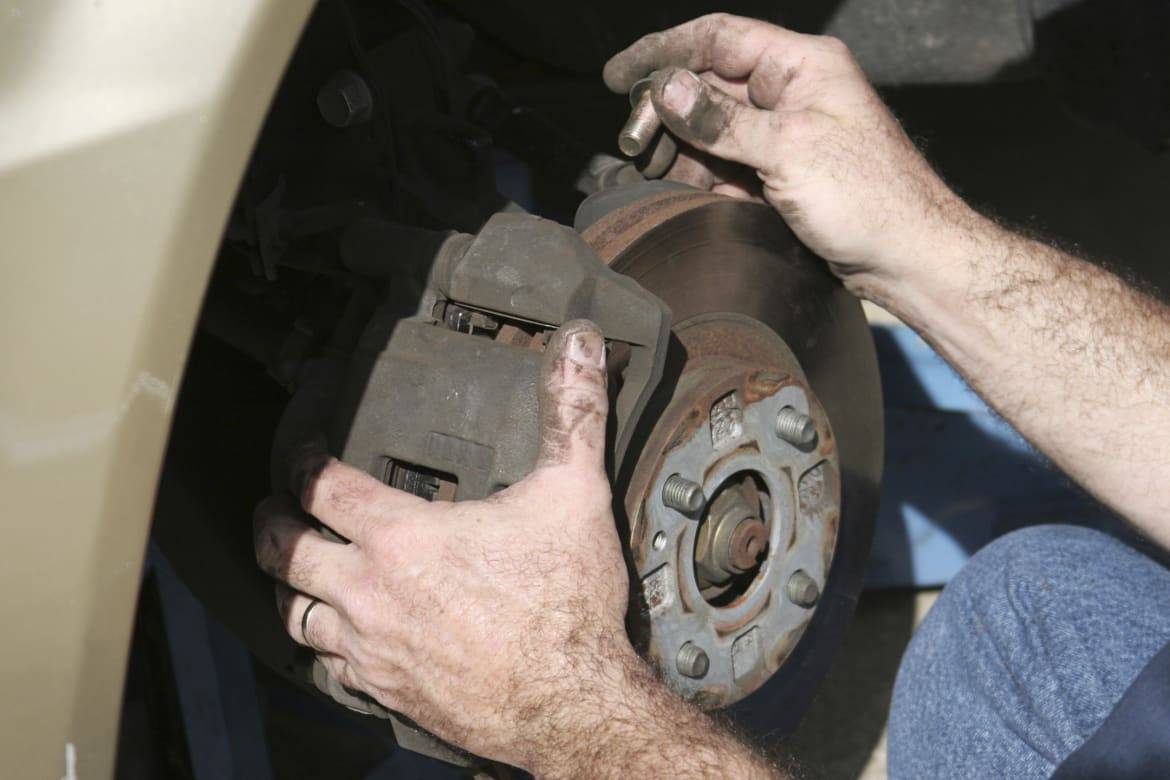Is There an Easy Way to Clean Up Rust on the Rotors of My 2015 Crv
NEWS
Pros and Cons of Replacing Your Own Brakes

By Rick Popely
January 9, 2018
CARS.COM — If you have the know-how to do your own brake work or know someone who does and is willing to share their expertise for free, the do-it-yourself approach to replacing brake pads and rotors on your vehicle can save you lots of money. But be sure you know what's wrong before you get started or you could waste a lot of both. Modern brake systems are complex, and while replacing your brake pads and rotors is a fairly straightforward process, it could go wrong if you aren't sure what you're doing.
Related: Brake Pads: What You Need to Know
The cost of brake pads, rotors, calipers and other parts varies widely by brand and model, and you should expect to pay more for brake work on a vehicle like a BMW than on a Honda. Doing it yourself also means you choose the parts that go on your car, you're in charge of quality control and you do it on your own schedule. If you are thinking about doing your own brake job and your vehicle has disc brakes, there are a few supplies you need to have on hand:
- Brake fluid
- Brake pads
- Brake rotors (sometimes referred to as brake discs)
- Brake grease
You will also need a C-clamp or a specialized brake tool to compress the pistons in your brake calipers to remove the old brake pads. Brake service seems simple enough. All you need to do is put the car up on a jack, use jack stands for extra safety, loosen the lug nuts, remove the wheel, replace the pads and possibly the rotors, and pour in some brake fluid, right?
Unfortunately, do-it-yourself brake repair is a bit more complex than that. The components of disc brake systems are located directly behind each wheel, and in some vehicles, there isn't much room to maneuver. Because your wheels travel through rain, snow and other debris, brake parts, like calipers, also commonly rust, making them difficult to remove. And these are just a few of the things that can make a basic brake job more difficult.
Potential Complications With Replacing Your Own Brakes
If changing your brakes was always as simple as just quickly swapping old parts for new ones and adding some brake fluid, we would recommend that anyone with a little mechanical skill perform their own brake repairs. Brake maintenance, though, isn't always as simple as just removing and replacing pads and rotors, and it is more involved than, say, a standard oil change. Installing new brake pads can quickly become a more complicated project than you anticipated.
For example, unevenly worn brake pads could be the result of sticking caliper slide pins, the calipers themselves might need cleaning, lubricating or replacement, and excessive brake pedal travel might be the result of air in the hydraulic brake lines, not friction or worn pads. You may also find yourself in need of additional replacement parts like a master cylinder, brake caliper or piston. What you think is a simple brake pad replacement job could also become more complex if you discover that a grinding sound is being caused by a faulty rotor rather than worn-out pads. If you finish the job and the brake pedal doesn't feel quite right, or you notice a squeal, grinding or squeaking noise when you drive your car, you may find yourself needing to start all over to determine what you did wrong. You may just need to add more brake fluid or use brake grease to reduce friction, or you may need to diagnose a more in-depth problem with your brake system.
If you don't have the knowledge to diagnose what might be wrong or the tools or experience to correct it, you might be wasting time and money by replacing parts because they're the usual suspects. You might know your vehicle better than anyone, but a good mechanic probably knows more about brakes than you do. Whether you choose a local mechanic or a chain company like Pep Boys, repair shops also guarantee their labor as well as the parts they install, so if something doesn't seem right after a brake job, they usually stand behind it and fix what's wrong.
If you decide to do the work yourself, be sure you're addressing the root causes of your brake issues, and make sure pads, rotors and other parts really do need replacing before you buy new ones. Above all, know your limits, because brakes are what stop your car and you don't want to make a dangerous mistake.
Cars.com's Editorial department is your source for automotive news and reviews. In line with Cars.com's long-standing ethics policy, editors and reviewers don't accept gifts or free trips from automakers. The Editorial department is independent of Cars.com's advertising, sales and sponsored content departments.
Source: https://www.cars.com/articles/pros-and-cons-of-replacing-your-own-brakes-1420680331132/
0 Response to "Is There an Easy Way to Clean Up Rust on the Rotors of My 2015 Crv"
Post a Comment